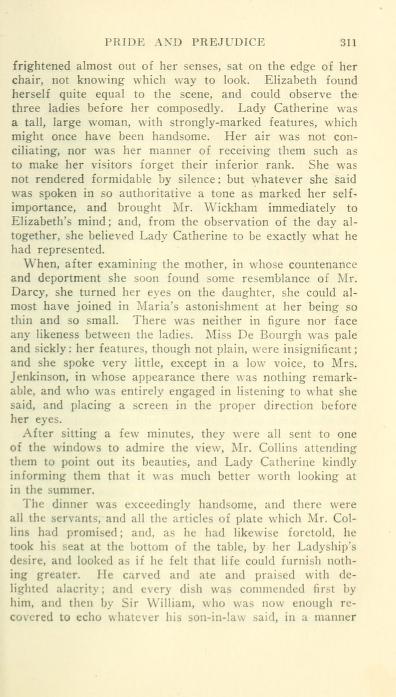 ............prev...................v?....................next
............prev...................v?....................next {{prhprp311.jpg}}
frightened almost out of her senses, sat on the edge of her
chair, not knowing which way to look. Elizabeth found
herself quite equal to the scene, and could observe the
three ladies before her composedly. Lady Catherine was
a tall, large woman, with strongly-marked features, which
might once have been handsome. Her air was not con-
ciliating, nor was her manner of receiving them such as
to make her visitors forget their inferior rank. She was
not rendered formidable by silence: but whatever she said
was spoken in so authoritative a tone as marked her self-~
importance, and brought Mr. Wickham immediately to
Elizabeth's mind; and, from the observation of the day al-
together, she believed Lady Catherine to be exactly what he
had represented.
When, after examining the mother, in whose countenance
and deportment she soon found some resemblance of Mr.
Darcy, she turned her eyes on the daughter, she could al-
most have joined in Maria's astonishment at her being so
thin and so small. There was neither in figure nor face
any likeness between the ladies. Miss de Bourgh was pale
and sickly: her features, though not plain, were insignificant;
and she spoke very little, except in a low voice, to Mrs.
Jenkinson, in whose appearance there was nothing remark-
able, and who was entirely engaged in listening to what she
said, and placing a screen in the proper direction before
her eyes.
After sitting a few minutes, they were all sent to one
of the windows to admire the view, Mr. Collins attending
them to point out its beauties, and Lady Catherine kindly
informing them that it was much better worth looking at
in the summer.
The dinner was exceedingly handsome, and there were
all the servants, and all the articles of plate which Mr. Col-
lins had promised; and, as he had likewise foretold, he
took his seat at the bottom of the table, by her Ladyship's
desire, and looked as if he felt that life could furnish noth-
ing greater. He carved and ate and praised with de-
lighted alacrity; and every dish was commended first by
him, and then by Sir William, who was now enough re-
covered to echo whatever his son-in-law said, in a manner
[311]............prev.....................next................